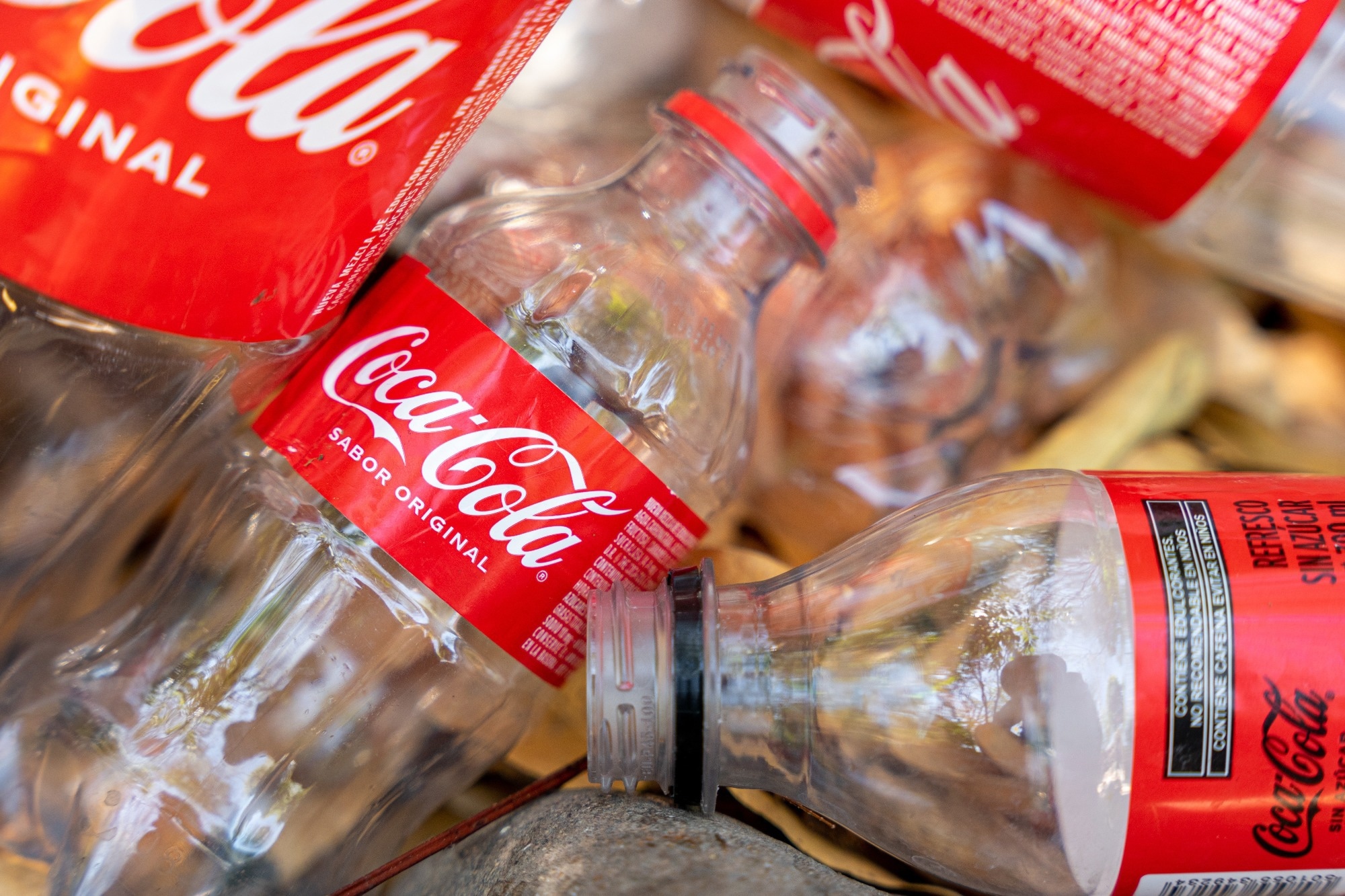In a move towards sustainable packaging, Coca-Cola, one of the world’s leading beverage companies, has unveiled an ambitious initiative to transform plastic production. Fueled by their commitment to achieving net zero emissions by 2040, Coca-Cola is spearheading a pioneering project at Swansea University,1 aiming to produce bottle tops using carbon dioxide (CO2) extracted directly from the atmosphere.2 This revolutionary approach marks a significant leap forward in the realm of sustainable materials, potentially reshaping the future of plastic manufacturing.

Image Credit: JRomero04/Shutterstock.com
The Science Behind Coca-Cola’s Initiative
Traditionally, plastic production has heavily relied on fossil fuels, contributing substantially to global carbon emissions. However, Coca-Cola is seeking to disrupt this norm by entirely de-fossilizing the process.
The core of this innovation lies in a sophisticated chemical process where CO2, extracted either from the air or factory emissions, is combined with water. An electric charge is then applied, leading to the production of ethylene, a crucial component of plastic. This method eliminates the reliance on fossil fuels, paving the way for a more environmentally friendly plastic production cycle.3
The significance of this process lies not only in its environmental impact but also in its technical ingenuity. By using CO2 as a starting material, Coca-Cola is fundamentally altering the production landscape.
Professor Enrico Andreoli, the project's principal investigator and an industrial chemist, emphasizes the potential of this approach. He states, "Our starting material is carbon dioxide, so we entirely de-fossilize the process and make plastic-free from fossil fuels and fossil carbon." This innovation marks a paradigm shift, challenging traditional methods and setting a new standard for sustainable plastic production.
The Environmental Implications and Global Benefits
Coca-Cola's initiative holds immense promise for the environment and the global fight against climate change. By harnessing CO2 from the atmosphere, the company is not only reducing its own carbon emissions but also actively contributing to combating climate change.
If successfully scaled up, this technology could revolutionize the entire plastic production industry, offering a sustainable alternative to the environmentally detrimental practices of the past. This move has far-reaching global benefits, positioning Coca-Cola as a frontrunner in the race toward a greener future.
We’re incredibly excited about the potential of this research. We know that making our packaging materials more sustainable is key to decarbonising our business, and technology will play an important role in helping us solve this challenge…
Through Ventures, we are committed to seeking out and funding solutions that will build a better future for our business, communities and the planet. If scaled, this technology could impact both our fossil fuel use and carbon emissions and help to accelerate a low-carbon future for CCEP.
Craig Twyford, Head of CCEP Ventures
These investments aim to enhance the sustainability of crucial raw materials and packaging components over the long run. By doing so, Coca-Cola is helping to expedite the opportunity to decrease significant CO₂ emissions within supply chains, all while cutting down on expenses related to materials, transportation, and logistics.
Exploring New Avenues and Collaborative Research
Looking ahead, Coca-Cola's commitment to sustainability extends beyond plastic production. The company is actively exploring diverse avenues for CO2 utilization, such as converting CO2 into artificial sugar, a venture that holds promise for diverse applications in the food industry.
Moreover, Coca-Cola is actively engaged in collaborative research endeavors, fostering partnerships between industry and academia. These collaborations are crucial in driving innovation, paving the way for the development of sustainable practices across sectors.
Coca-Cola’s bold step towards de-fossilizing plastic production stands as a testament to the power of innovation in the face of environmental challenges. By embracing cutting-edge technology and partnering with research institutions, the company is not only reducing its own carbon footprint but also inspiring a paradigm shift in the industry.
This initiative underscores the potential of large-scale CO2 utilization, offering a glimpse into a future where industries can thrive without compromising the planet’s well-being.
As the world grapples with the urgency of climate change, Coca-Cola’s commitment to sustainable practices serves as a beacon of hope. The scientific community and industries globally can draw inspiration from this endeavor, spurring further research and development in the pursuit of eco-friendly solutions. Through collaboration, innovation, and a shared vision for a sustainable future, the possibilities are boundless.
References and Further Reading
- CARBON UTILISATION FOR A GREENER FUTURE (no date) Swansea University. Available at: https://www.swansea.ac.uk/research/research-highlights/sustainable-futures-energy-environment/carbon-utilisation/ (Accessed: 16 October 2023).
- Pigott, P. (2023) Climate crisis: Coca-Cola trial to make bottle tops from CO2 emissions, BBC News. Available at: https://www.bbc.co.uk/news/uk-wales-67060151 (Accessed: 16 October 2023).
- Coca-Cola European Partners (2023) Cola EUROPACIFIC Partners announces second partnership to explore CO₂ upcycling technology, Coca. Available at: https://www.cocacolaep.com/media/news/2023/coca-cola-europacific-partners-announces-second-partnership-to-explore-co-upcycling-technology/ (Accessed: 16 October 2023).
- World without waste (no date) Sustainable Packaging. Available at: https://www.coca-colacompany.com/sustainability/packaging-sustainability (Accessed: 16 October 2023).